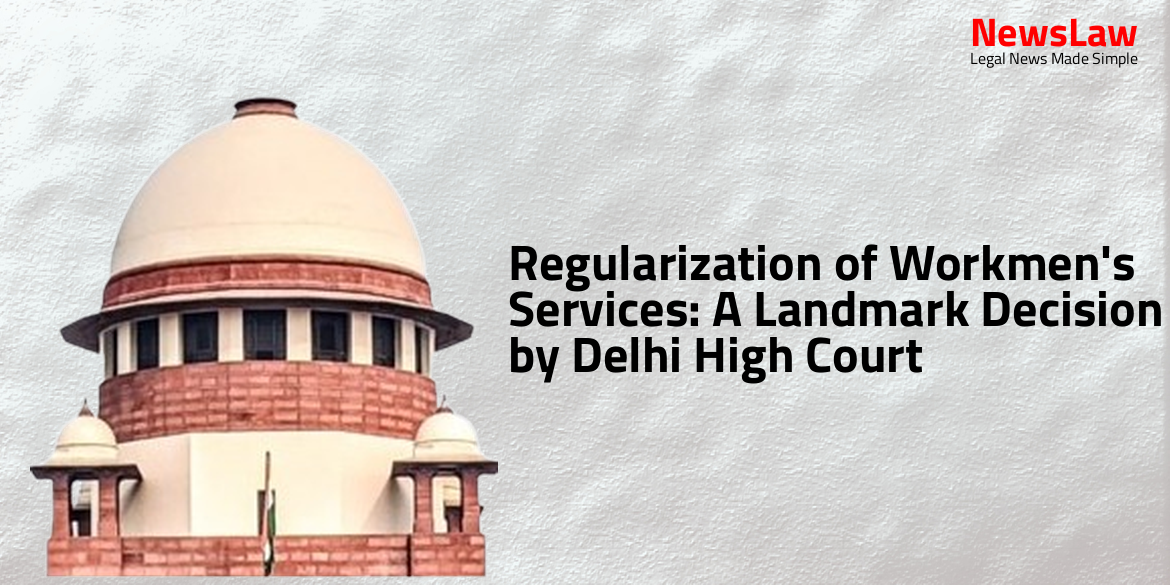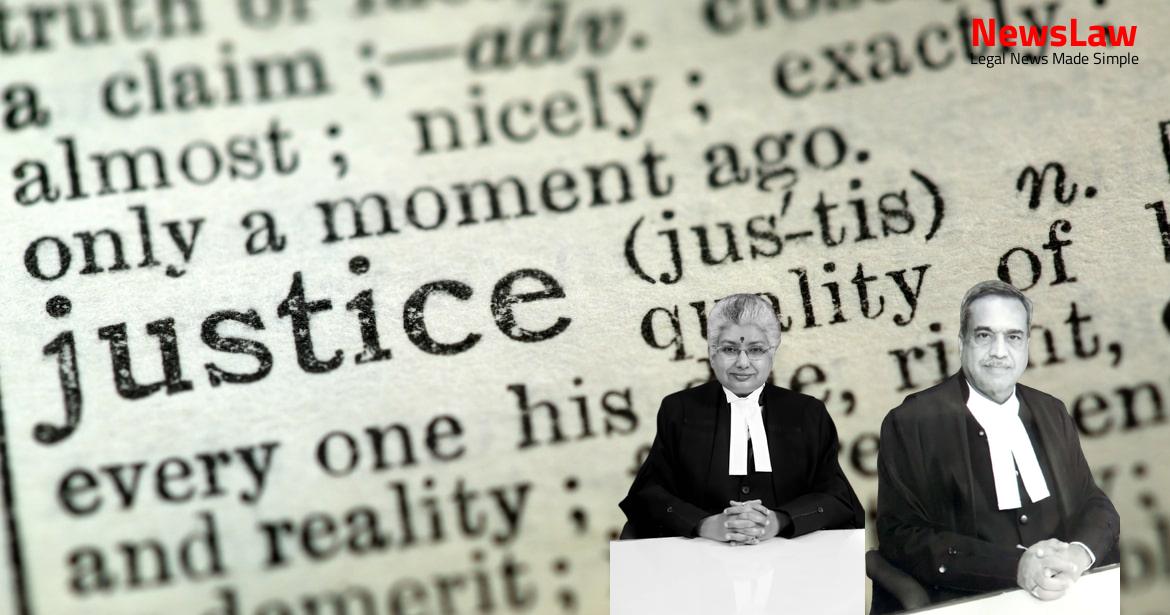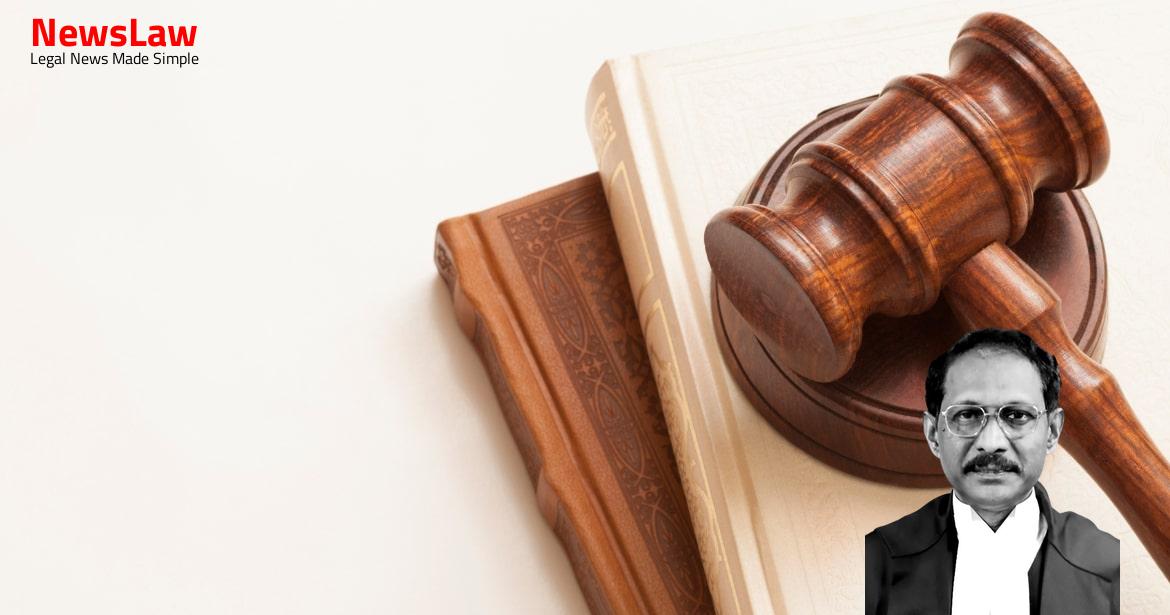In a significant legal case, the Delhi High Court delivered a landmark judgment regarding the regularization of workmen’s services. The Court’s decision highlights the importance of fairness and equity in labor practices, setting a precedent for similar cases in the future. The case involves a dispute between the workmen and the management, centered around the rights of the employees to be regularized after years of continuous service. The Court’s ruling reflects a commitment to upholding principles of justice and equality in the workplace.
Facts
- In 2010, the petitioner entity engaged the respondent workmen on contractual basis for the posts of AMI and APHI.
- In 2014, the respondent workmen filed a claim for regularization and differential wages.
- The Industrial Tribunal awarded in favor of the respondent workmen for regularization.
- The petitioner entity filed a writ petition under Article 226 of the Constitution of India to set aside the award.
- The factual and legal issues in the petitions are similar, consolidated for disposal.
- The Tribunal found that respondent workmen were selected properly through interviews, police verification, and medical examination for permanent and perennial jobs as AMI and APHI.
- After completing pleadings, the Tribunal framed four issues and issued the impugned Award on 13 November, 2019.
- The Award stated that the workmen should be regularized with the petitioner entity to their respective posts from the date of their initial appointment.
- Additionally, the workmen were deemed entitled to the principle of equal pay for equal work, including the difference in wages.
Issue
- The tribunal framed four issues to be addressed in the case.
- The first issue was related to determining the existence of an employer-employee relationship between the parties.
- The second issue focused on whether the workmen’s claim was properly represented by the Union.
- The third issue involved determining the entitlement of the workmen to their claim as per the terms of reference.
- Lastly, the fourth issue aimed to decide the relief that the parties were entitled to.
Arguments
- The petitioner entity contends that the non-regularisation of the services of the workmen was not unfair labor practice.
- The respondent workmen have been working continuously for the past ten years, contradicting the petitioner entity’s claim of temporary engagement.
- The Industrial Tribunal’s decision to regularize the workmen’s services was based on the violation of labor practices and statutory rights.
- The petitioner’s petition is seen as an attempt to prolong and deny the relief granted to the workmen.
- The respondent workmen’s counsel cited relevant judgments to support their position.
- The respondent’s counsel argued that the Industrial Tribunal’s decision was well-founded and should stand.
- The petitioner seeks reevaluation of the tribunal’s findings, which the respondent’s counsel argues is impermissible in a writ jurisdiction.
- The contractual basis of the workmen’s appointment was cited to defend against regularization.
- The respondent’s counsel argued that the rights of other potential candidates were prejudiced by the regularization decision.
- The lack of a robust mechanism for the appointment process was pointed out to argue against regularization.
- The petitioner maintained that the appointments were temporary until regular appointments could be made through proper recruitment processes.
- Legal precedents and CAT decisions were cited in support of the respondent workmen’s right to regularization.
- The respondent workmen argue that the union’s presentation in favor of the workmen is sufficient to give effect to the espousal of the dispute with the management.
- Workmen have led evidence to prove espousal of the dispute, including a resolution dated 28.02.2014 passed by the Municipal Employees Union, which was presided over by the General Secretary of the union.
- The respondent workmen oppose the petitioner entity’s claim that the impugned Award is defective, highlighting differences in facts and circumstances of the case.
- It is argued that the intent of Uma Devi (Supra) was not to allow unfair labor practices by the employer.
- Citing judgments like Sheo Narain Nagar & Ors vs State of Uttar Pradesh & Ors, the respondent workmen assert that the impugned award has been rightfully adjudicated.
- The respondent workmen claim that regularizing their services is their right after years of continuous employment, and the management’s actions constitute unfair labor practices.
- The respondent workmen challenge the petitioner entity’s assertion that tribunal cannot grant regularization to contractual employees, citing the powers of Tribunals in determining industrial disputes.
- The respondent workmen emphasize their prolonged service with the petitioner entity and assert their entitlement to regularization of services.
- It is stated that the petitioner entity has engaged in unfair labor practices by keeping numerous posts vacant. The issue before the Court is whether the workmen are entitled to regularization.
Analysis
- The Tribunal observed that depriving the workmen of their status and privileges as permanent employees by employing them as casuals is deemed an unfair labor practice.
- The Tribunal found that the petitioner entity treated the workmen unfairly by continuing their services on a contractual basis for 13 years despite performing similar work to regular employees.
- The evidence presented, including oral testimony and resolutions passed by the union, supported the claims of the workmen to be regularized.
- The management’s defense against the claims of irregular appointment and continuous employment of the workmen was not effectively rebutted.
- The Court emphasized the importance of recognizing the substantive nature of the work performed by the employees and their continuous service akin to permanent employees, aligning with principles of equity and fairness.
- The continuous employment of the workmen suggested de facto regularization, warranting their entitlement to be regularized at their respective positions.
- The financial hardship cited by the petitioner as a reason against regularization was considered legally untenable and rejected by the Court.
- The judgment highlighted the need for sympathetic consideration of long-term employees for regularization, balancing economic considerations with principles of fairness and justice in labor practices.
- The High Court’s application of the Uma Devi judgment does not fit the specific circumstances of the case.
- Principle of equal pay for equal work mandates fair treatment for workers performing identical duties.
- Employees working for a significant period, even initially on a temporary basis, should not be considered temporary forever.
- Prolonged temporary employment should not be used to deny workers benefits and security of regularization.
- Denial of equal pay for equal work goes against constitutional mandate ensuring fairness and justice in labor practices.
- Temporary or contractual status should not deprive a worker of equal pay for similar duties performed by a regular employee.
- Industrial workers working for longer durations are entitled to regularization.
- Judgment of Uma Devi not applicable to industrial workers.
- Proper recruitment procedures leading to lawful appointment allows for regularization of services.
- No specific form prescribed for regularization, depends on the facts of each case.
- Differentiation in pay and benefits for employees doing the same work violates Article 14 and Article 39(d) of the Constitution of India.
- The respondent workmen are entitled to regularization based on proper selection procedure, long period of service, and similarity of work to regular employees.
- Writ jurisdiction is supervisory and not appellate, therefore, cannot replace factual conclusions of the adjudicating body.
- Challenging a finding of fact based on insufficient evidence is not permissible in certiorari proceedings.
- The writ court will not re-evaluate evidence and substitute its own factual conclusions for those of the adjudicating body.
- No such circumstances of challenging the factual conclusions are present in the current petition.
Decision
- The impugned award dated 13 November, 2019 is upheld
- The judgment will be uploaded on the website immediately
- The batch of petitions challenging the award are dismissed
- All pending applications related to the petitions are also dismissed
Case Title: MUNICIPAL CORPORATION OF DELHI Vs. PRAMOD BHAN AND ORS (2024:DHC:4712)
Case Number: W.P.(C)-16307/2023



